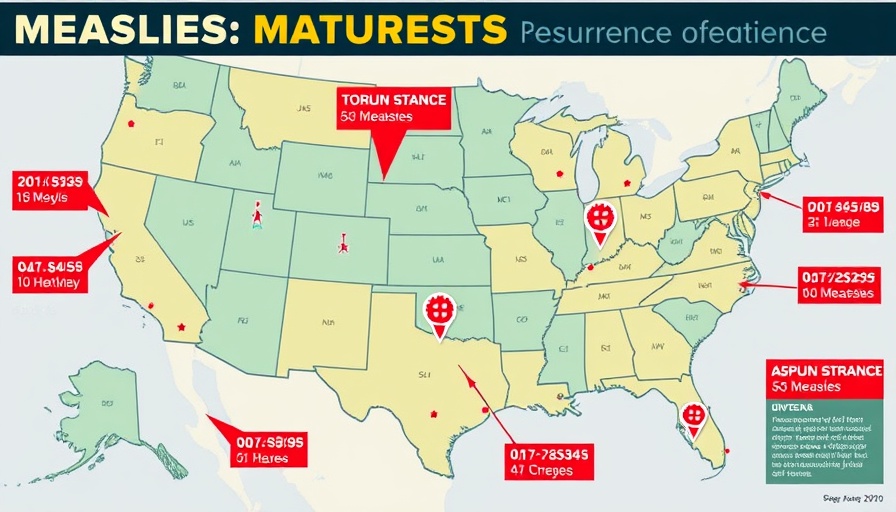
Measles Resurgence: A Wake-Up Call for Public Health
As strokes of alarming statistics emerge from the Centers for Disease Control and Prevention (CDC), the United States faces a significant surge in measles cases, a wholly preventable disease. In recent years, the initial widespread achievement of vaccination targets has noticeably declined, triggering concerns among health officials about the resurgence of vaccine-preventable diseases, and at the forefront is measles. In 2021 alone, registries reported at least 200 cases, a stark rise that compels focus on the role of misinformation regarding vaccines.
Understanding the Vaccine Hesitancy Phenomenon
The roots of vaccine hesitancy run deep. While access and awareness about vaccines have traditionally improved, misinformation—exacerbated by social media and public discourse—has led some parents to hesitate about vaccinating their children against serious illnesses like measles. Prominent sensationalist narratives often amplify misguided fears about vaccine side effects without holistic context, undermining scientific consensus. Even with a remarkable safety record, questions raised about vaccine integrity have resulted in hesitancy and, consequently, declining vaccination rates.
Consequences of Vaccine Decline: Erasing Hard-Won Gains
The decline in vaccination rates significantly impacts herd immunity, which safeguards the broader population, especially the most vulnerable groups that cannot be vaccinated due to pre-existing health conditions. Measles is not only highly contagious, but it can also lead to severe complications, including pneumonia and encephalitis, particularly in young children. Recent outbreaks indicate that communities with low vaccination rates are most at risk, showcasing how easily we could revert to pre-vaccine era health crises if complacency continues.
A National and Local Response to Misinformation
Several initiatives are underway to combat anti-vaccine misinformation, spearheaded by community health organizations and public health officials. The goal is not merely to rebuild vaccination numbers but to reshape the narrative around vaccines through education and transparency. Community workshops, trusted local leaders addressing concerns, and social media campaigns that relay factual information about vaccines are becoming the tools of choice to fight against misinformation.
Looking Ahead: The Path to Crisis Prevention
Health advocates urge a proactive approach to counter measles resurgence. Community outreach programs championing vaccine literacy can significantly alter public perceptions. Local health departments also concentrate on establishing easy access to vaccinations in schools and neighborhoods, reinforcing that vaccines are both safe and beneficial. Strengthening educational campaigns to displace myths with facts aims to restore public confidence in vaccination.
Conclusion: Taking Action in Our Communities
With rising measles cases woven into broader discussions about health equity and misinformation, each individual’s voice contributes to the collective fight against vaccine-preventable diseases. Social responsibility calls for engagement—whether advocating for vaccinations at community levels or addressing misinformation in personal conversations. By empowering each other with knowledge, communities can reclaim public health's gains, ensuring a healthier future for generations to come. It's imperative now more than ever to take decisive action in safeguarding our communities against harmful misinformation and disease resurgence.
 Add Element
Add Element  Add Row
Add Row 



 Add Row
Add Row  Add
Add 


Write A Comment